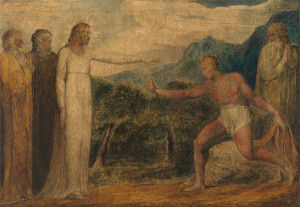Thoughts on Today’s Lessons for Oct. 25, 2015

‘Christ Giving Sight to Bartimaeus, 1799-1800, William Blake, in the Yale Center for British Art.
When God is with us, when God saves us, when God makes us well, we show our gratitude and joy with shouts of thanksgiving. Let’s hold this theme of gratitude and grace in our thoughts as we reflect on today’s readings. Here, the Prophet Jeremiah, in loving words and with tears of comfort and joy, tells Israel that God will bring them out of exile. The weak and the strong, mothers and children, those who can’t see and those who can’t walk, will all come back home together, praising God and giving thanks.
Psalm: Psalm 126
Surely the Psalmist had Jeremiah’s happy prophecy in mind when he wrote these lines of joy. We sing in celebration of Israel’s restoration on Mount Zion, Jerusalem, the home of the Temple. Turning to a deeply meaningful image of planting fields and reaping a harvest bounty, we sing in memory of our ancestors sowing with tears, reaping with songs of joy; going out weeping, carrying the seed, but bringing home ripe sheaves of grain, joyfully shouting out our thanksgiving.
Second Reading: Hebrews 7:23-28
Seeking to bring Jewish converts back to the infant church, the author of Hebrews compares Judaism unfavorably to Christianity in words that now sound un-generous. Jesus is a far greater high priest than the old high priests of the Temple, these verses proclaim. The old high priests were mortal, sinful humans, who had to purify themselves through sacrifices. Perhaps it’s better simply to stand with this reading’s conclusion: Jesus, made perfect forever, stands for us all through his sacrifice on the cross.
Gospel: Mark 10:46-52
Blind people in ancient times were desperate and ashamed. They had to beg for food, and their neighbors often assumed that their blindness was punishment for some grievous sin. Sadly, physical blindness has also been an enduring metaphor for willful refusal to “see” or believe. Mark’s Gospel uses this image often, telling of such healings at the beginning, and now again at the end, of his long narrative about the apostles’ inability to comprehend Jesus’ message. But blindness is not really the central point of today’s Gospel. Rather, we see God most clearly in Bartimaeus’ gratitude … and in his decision not to go away but to stay and follow Jesus.
